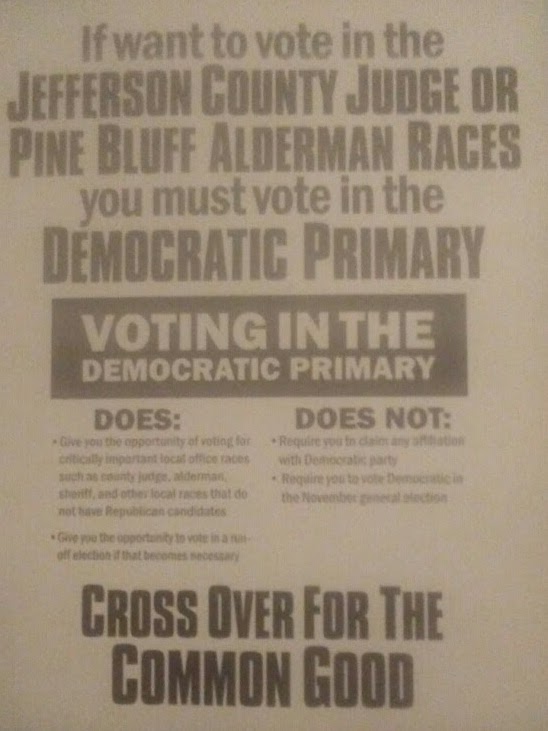Did Illegal Votes Influence the Outcome of the Democratic Primary Election?

By Michael McCray — The Arkansas Preferential Primary were held on Tuesday, May 24. Despite its population size, Pine Bluff had several dogs in the hunt running statewide campaigns during the primary elections last month. There were two candidates with hometown roots running for governor, Chris Jones (4,335) on the Democrat side, and Sarah Huckabee Sanders (3,182) as the Republican nominee.
Both enjoyed solid victories. However, there were much closer local races. There was a Democratic runoff for Pine Bluff alderman in the 1st Ward and 3rd Ward and constable for Vaugine Township.
Here is the thing—crossover Voting could have changed the outcome for two of these elections.
Arkansas has closed primary elections. This means you have to select which primary (GOP or DEM) you would like to participate in—you can also select a non-partisan (Judicial Elections) ballot. However, once you choose a primary contest, you can only vote in that primary and runoff election. The Republican Party in Jefferson County has a long history of interfering in the Democratic primary elections because the City of Pine Bluff is overwhelmingly Democratic. Earlier this year, Alderman Whitfield disclosed a letter encouraging a GOP PAC (Dark Money) to support their preferred slate of candidates in the Democratic primary election. See article Dark Money refers to political spending meant to influence the decision of a voter, where the donor is not disclosed and the source of the money is unknown. Here is another example. In 2018 local Democrats filed an ethics complaint against Mike Adams, the current chairman of the Jefferson County Election Commission, for distributing campaign literature encouraging crossover voting.

The complaint was ignored—never acted upon.
If you are a Republican, you can request a Democratic ballot and participate in the Democratic primary–this is controversial but legal. Additionally, if you did not vote, you can vote in the Democratic runoff election. And if you voted non-partisan, you can also vote in the Democratic runoff election.
However, suppose you request a Republican ballot and participate in the Republican primary. In that case, you cannot vote in a Democratic runoff election. That is illegal crossover voting.
The 1st Ward and 3rd Ward races were hotly contested. The results were as follows:
The outcome of both races were victories by the GOP-backed (GFPB supported) candidates Go Forward Pine Bluff is a private non-profit organization founded by Simmons Bank. The African-American female candidates, including LaTisha Brunson over Danny Walker by 182 votes and a surprise upset, by political newcomer Lannette Frazier over incumbent Ivan Whitfield by 35 votes. Illegal crossover voting could have determined the outcome of one if not both of the Pine Bluff City races. For example, if you voted for Huckabee, you could not vote for Frazier. Likewise, if you voted for Huckabee, you could not vote for Brunson.
It appears that 60% of the votes that defeated 3rd Ward Alderman Ivan Whitfield may have been cast illegally.
Here are some quick back-of-the-napkin math calculations:
There were 3,788 people who participated in the Republican Primary Election in Jefferson County. Roughly 55% of Jefferson County residents live in Pine Bluff. Thus, 2,083 people participated in the Republican Primary Election in Pine Bluff. The wards are roughly equally divided population-wise. Since the difference in the 3rd Ward race was only 35 votes, 520 potential Republican voters could have determined the race’s outcome. Likewise, the difference in the 1st Ward race was 182 votes. Therefore, 520 potential Republican voters could have changed the result of that race.
Jefferson County Clerk Shawndra Taggert and Jefferson County Election Commissioner Sharon Hardin Rasberry insist that the new voting equipment does not allow for illegal crossover voting to occur. However, the Arkansas Delta Informer has reviewed the election data for Wards 1 and 3, which appears to be anomalous and includes potential voting irregularities. For instance, two candidates (David Knott and Danny Walker) in Ward 1 and a former Mayor (Carl Redus) are mislabeled in the database as requesting non-partisan ballots. Therefore, computer controls could not stop mislabeled crossover votes. It is doubtful that any Democratic primary candidate elected not to vote for themselves. Both Redus and Knott confirmed that they voted in the Democratic primary.
In addition, the Arkansas Delta Informer identified dozens of potentially illegal crossover voters in Wards 1 and 3. We conducted a name search on the republican primary election voters and the runoff results. Any duplicate name could be a potential illegal crossover voter, necessitating further investigation. Based on this review we found Most disturbing, it appears that 60% of the votes that defeated 3rd Ward Alderman Ivan Whitfield may have been cast illegally.
Consequently, we may never know the actual outcome of this race. There were 3,788 Republicans who voted in the Jefferson County primary elections. Unfortunately, the Jefferson County Clerk’s Office can only identify 3,767 Republican records, which means 21 Republican voters are missing. If these were 3rd Ward voters, it would change the election’s outcome. Once you adjust the 3rd Ward tally for the potentially illegal crossover votes (previously identified), the difference in the race was only 12-15 votes.
The runoff election results were certified by the Jefferson County Election Commission on Thursday, June 30, 2022, in a public meeting.



 Sign up as a free Arkansas Delta Informer digital subscriber and get breaking news and weekly news roundup in your inbox.
Sign up as a free Arkansas Delta Informer digital subscriber and get breaking news and weekly news roundup in your inbox.